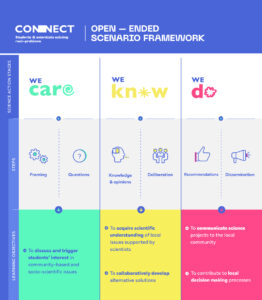News . Our Blog Open-ended scenarios – Adapting participatory methods to open schooling

The open-ended scenarios developed by CONNECT is a novel model adapting participatory methods to open schooling and the CONNECT CARE-KNOW-DO framework. It is an experiment aiming at encouraging students’ interest in science by approaching it from a perspective where societal needs and values are at the core.
Students are able to set the agenda for their own process as they will be determining the challenge they will be working with. Therefore, based on their own interests, as well as experiences within their community the students will decide on a local challenge they want to work with as the first step of the process.
It is moreover an open and inclusive process as families are engaged and will support the students throughout the process. The students will also consult with different scientists, researchers and stakeholders who have relevant knowledge on the chosen challenge. Hereby, the students get to understand different perspectives, approaches and effects of the challenge they are working with. Based on these consultations the students will be able to formulate well-informed and knowledge-based recommendations for how to deal with the challenge. By the end of the process, the students will disseminate these recommendations, ideally to local decision-makers and encourage them to take action.
Open-ended Scenario: six steps - two formats
The open-ended scenarios are structured around a framework of six steps developed by The Danish Board of Technology. It is built upon many years of experience with participatory methods, deliberative democracy and technology assessment.

The six steps are structured after important elements in such processes. When going through an open-ended scenario the students will always go through these six steps. The content of the steps varies depending on the format of the open-ended scenario.
So far two formats have been developed – a Pilot Open-ended scenario, loosely structured around the citizen jury method as well as a Consensus Format Open-ended scenario, an adaptation of the consensus conference method. In 2022 a third open-ended scenario format based on co-creation will be developed, providing schools with three types of open-ended scenarios processes to choose between.
One of the major differences between these two formats is that the Pilot Open-ended scenario is focused on voting as the students vote to choose a topic and to prioritize their recommendations, while in the Consensus Format Open-ended scenario, the students need to come to an agreement, on the agenda, on issues for the recommendations and on the recommendations.
Each Open-ended scenario format comes with different types of information material, such as a teacher’s and student sheets.
This and more information will soon be available on our online platform.